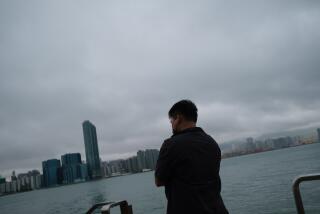‘To Get Rich Is Glorious’
HONG KONG — Restaurateur Tony Chan can tell the mainland Chinese by what they order: pricey Shanghai hairy crabs and the best Chinese wine. So when they leave his Golden Snow restaurant, he doesn’t ask for money.
“They just give us their business card, and we bill them at the end of the month,” he explained.
Another way to pick them out, a taxi driver explained, is “they’re the ones carrying the suitcases filled with cash.”
In the final days leading up to Hong Kong’s return to the motherland, the mainlanders are already reshaping the social strata and the power structure of this cosmopolitan Asian metropolis, giving new meaning to late “paramount leader” Deng Xiaoping’s exhortation that “to get rich is glorious.”
Although China remains a relatively poor country, these immigrants and their mainland-backed firms come armed with cash. They have sunk an estimated $50 billion into Hong Kong assets over the past decade, making mainland China one of the colony’s leading investors. They also hold one-quarter of the territory’s bank deposits, one-fifth of insurance premiums and one-eighth of all construction contracts.
It is assumed here that China’s leaders will use their political leverage to gain a favored position for mainland Chinese companies, particularly at the expense of British hongs, or trading firms, that have enjoyed a special franchise under British rule.
This worries some, but others are resigned to it. Michael Green, an analyst with Salomon Bros. in Hong Kong, said it is foolish not to expect Chinese interests to be favored after July 1, just as the British firms had an upper hand for the past century and a half.
“People like myself who can’t read Chinese or write Chinese had better concentrate on other strengths,” he said. “We’d better outperform in other areas.”
Investors have little doubt about where to place their bets. The stock prices of so-called red chip firms--holding companies set up in Hong Kong by mainland firms--have soared an estimated 70% on the Hong Kong Stock Exchange since the beginning of this year. They are a way to buy into China without the risk associated with the volatile Chinese stock markets.
Unlike earlier waves of mainland refugees who crossed into Hong Kong with nothing more than the clothing on their backs, these newcomers are arriving with a Western education, money and the most valuable commodity of all: close ties to the Communist Chinese leadership.
*
The most visible of the mainland power brokers is Larry Yung Chi-kin, a Stanford-trained engineer whose father, Rong Yiren, is China’s vice president and a protege of Deng. Yung heads CITIC Pacific, an $11-billion operation that holds major stakes in several British-controlled institutions--Hongkong Telecom, Cathay Pacific Airways and China Light & Power.
Beijing may exhort its officials to live a frugal life during their postings overseas, but the mainland officials who frequent the Hsin Kuang Restaurant in Hong Kong’s Wanchai nightclub district are known to spend $400 to $500 a meal.
One Hong Kong saleswoman said her mainland customers, who are usually shopping for gifts for business associates and officials, prefer Italian and French leather briefcases and expensive pajamas.
Among the colony’s newly arrived power elite, the language of choice is Mandarin rather than Cantonese, the favored watering hole is the China Club, and the cuisine scene is pricey live seafood.
The demand from mainland investors for a second home, including luxury residences on prestigious Victoria Peak, has also fueled a surge in property prices in Hong Kong’s tight market.
*
A measure of the growing influence of mainlanders in Hong Kong is the launch last month of the Federation of Mainland Professionals. The group began as an informal Friday night gathering of friends and now has 50 members, an events committee and a press officer.
Under federation rules, members must speak fluent English, must have studied at a top Western university and must have worked overseas. One member, who asked not to be identified, said the club is attempting to change the image that mainlanders are country bumpkins with no style or culture.
But there is yet another sure-fire way to spot the transplants from the mainland: The men have the habit of leaving clothing labels stitched to the outside of their suit sleeves.
“The best is a big European-sounding label,” explained a cashier at China Resources Center Department Store in Kowloon. “One label is good for a couple of months, just enough time for people to recognize it as imported and very cool.”
Silvia Cavallini of The Times’ Hong Kong Bureau contributed to this report.
More to Read
Sign up for Essential California
The most important California stories and recommendations in your inbox every morning.
You may occasionally receive promotional content from the Los Angeles Times.










